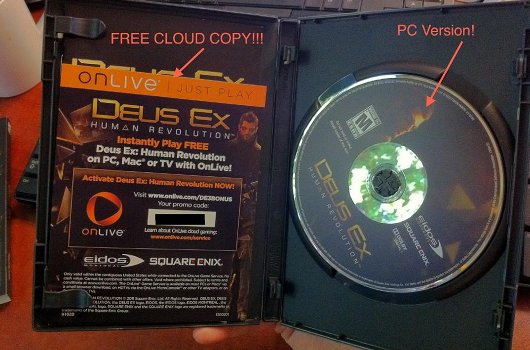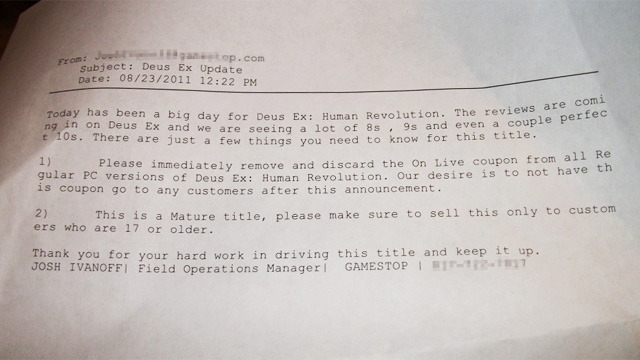I have made a rather big deal about the release of Deus Ex: Human Revolution this week, and in the few hours I have had to play it so far – it is clear we finally have a true follow-up to one of the greatest video games of all time.
As I have gone to an ‘all digital’ gaming world, I had pre-ordered it through Green Man Gaming, and since the game is SteamWorks based I was able to add the game to my Steam account and have it fully pre-loaded when it was released!
For those who bought the game as a physical copy at retail or through an online retailer, they got a surprise: OnLive included a free voucher for a copy of the game on their service! When I read about that I thought – what a great move! OnLive is a great service, and this provides a way for new customers to experience the service right along-side the game they just bought!
Apparently the retailer GameStop – who bought casual game service Kongregate a couple of years ago and just acquired digital retailer Impulse as part of a strong digital push – didn’t think too highly of this, and ordered employees to rip the vouchers from the games. Here is the letter that was sent:
According to Ars:
GameStop spokesperson Beth Sharum confirmed the practice, telling Ars that “Square Enix packed the competitor’s coupon with our DXHR product without our prior knowledge and we did pull these coupons.”
Competitor? Did I miss the part where GameStop had a service that allowed remote streaming of game content to computers that couldn’t otherwise run the game? Or is anyone selling games ‘a retailer’? Probably the latter, as general opinion is that this move was ‘legal’.
Is ANYONE surprised? GameStop is a regular in the ‘worst company in America’ lists due to their shady practices – they push useless accessories hard (employees have quotas), offer dreadful trade-in values for games then then immediately mark back up to $5 off full price, and they are in the regular practice of not selling games that would qualify as ‘new’ anywhere else.
The last one bears explanation: when a game leaves the publisher, it is wrapped in shrink-wrap with security seals in place. For most retailers, removal of those seals and the shrink-wrap means the game is no longer ‘new’ and cannot be returned. At GameStop, it is regular practice to remove all of that, and stick the game disk in an envelope … and then stick the game back in the case and sell it to you as new!
A few years ago I had some issues with my local GameStop. I had bought a ‘new’ PSP game, that ended up being in pretty lousy shape when I went to play it, but that I hadn’t noticed as they pulled from the envelope and put it in the case. I had to get the store manager involved to get a replacement disk the very next day, and even then they did it begrudgingly – and my point was that was what happened for not selling ‘new’ games … GameStop assumed liability for condition when they opened the case. The manager didn’t accept that – and GameStop corporate policy doesn’t differentiate between ‘sealed’ and ‘unsealed’ … at least when THEY are the ones holding the game.
Soon after that event I was getting a game for my older son as a surprise that I had pre-ordered. I specified multiple times that I wanted it ‘new’, and that to me ‘new’ means ‘sealed’. My son – like many kids – loved ripping apart the package for the first time as part of the new game experience. When I went to pick it up, I brought a PC game I had just bought a few days before in a GameStop bag with receipt.
When I got to the store, naturally they wanted to give me a game that had been opened, and I complained that I wanted it ‘new’. They said ‘this IS new’ … and I asked: is this EXACTLY as it was received from the publisher? Obviously they couldn’t say ‘yes’, but fell back on policy. I asked if there was any way to ensure the DLC codes were not compromised since the game box was on a shelf unwrapped … and again they couldn’t. So I asked again how it qualified as new … to no avail.
When it came time to pay I brought out my game and said I wanted to return that and use the credit to pay for the new game. They said, naturally that they couldn’t take the game as it was opened. You can see where this argument was going – they had one standard for their ‘new’ games and another for customer games.
It is this willful and flagrant misuse of customers that earns them regard as a ‘necessary evil’ rather than a store anyone likes. So the move with Deus Ex is no surprise – just more typical crap from the slimiest store in the business.
While it might be ‘legal’, it is just not right! If you head to Walmart, you get a nice sealed case with everything the publisher intended. Same for Target, Best Buy, Amazon and so on. Only at GameStop do you get adulterated product with value-added material removed sold as new and whole … and without any notice or thought that this is a bad idea!
In the wake of a wide-spread internet freak-out over GameStop being the abhorrent slimebags they are ‘in their DNA’, they have decided to pull the games from shelves. Now THAT is the correct thing to do! If you disagree with a publisher practice you are NOT correct in removing value from your customers, but you ARE correct in refusing to sell the product.
Was Square Enix right in doing this pack-in of an OnLive voucher without informing their retail supply chain? Absolutely not! You can bet that Squeenix saw financial benefit from the inclusion, so witholding the information is pretty slimy on their part.
But again, had their not been an uproar, think of what GameStop was doing – reaping the benefit of a sale while removing something of value from their customers because of competition concerns. Whether or not they are legally in the right, this set of moves demonstrates pretty clearly how GameStop views their customers.
If you bought Deus Ex: Human Revolution from GameStop and did NOT get the OnLive pack-in (even if you don’t care), you should go back and demand a refund. GameStop had no right to make that change without informing customers.


